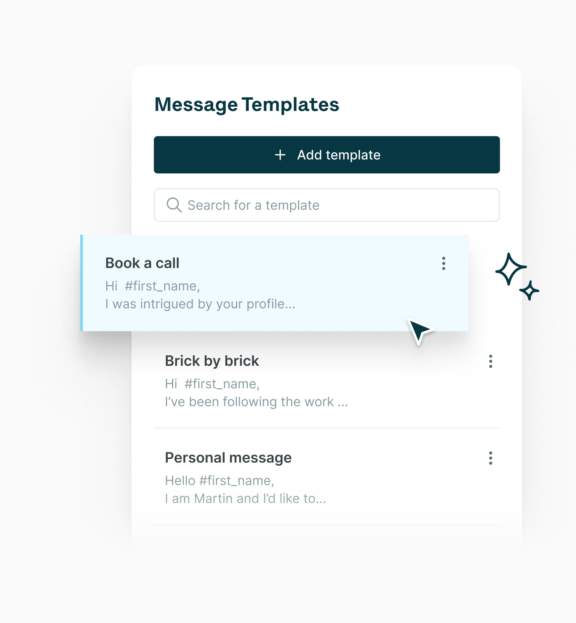Mastering LinkedIn messaging with next-level templates

LinkedIn is the platform for sales teams to focus their outreach. Mastering outreach on LinkedIn, increasing your response rates, and booking more meetings is easy with message templates.
Some argue it exceeds even email when we look at metrics such as reply rate, meetings booked, and deals closed. However, the challenge of standing out in the crowded inboxes of prospects is a common challenge faced by many.
Generic messages often get lost in the shuffle or are dismissed at a glance.
Key Highlights
What tool to use for your LinkedIn message templates
Surfe bridges the gap between LinkedIn and your CRM. Not only streamlining your workflow, Surfe enhances the impact of your outreach with message templates for LinkedIn.
Surfe’s message templates are designed to bring a blend of personalization and scalability to your LinkedIn messaging strategy, thereby increasing your response rates manifold.
But using Message Templates for LinkedIn is only half of the solution. It’s a tool in your repertoire but it’s how you use this tool that matters. Using Message Templates for LinkedIn in the wrong way can backfire if your templates are lacking context or personality. It’s all about crafting the right templates and using them at the right time.
Generic messages often fall on deaf ears. They are easy to spot and easier to ignore. A message that reads like a mass-produced script sends a signal that the sender might not have a genuine interest or understanding of the recipient’s profile or needs. This lack of personal touch can result in low response rates, making your outreach efforts futile. It can also damage your future outreach opportunities. Once your brand is associated with aggressive sales tactics that sweep across a large group of people with little effort hoping to scoop up a few deals, your prospects recognize that and they’ll remember
Personalized messaging is made easy with Surfe.
Surfe’s message template features:
- Insert a message template into LinkedIn messages or InMail in one click.
- Use variables like #firstname and #currentposition to personalize your messages automatically.
- Send automatic intro messages to new connections.
- View the response rates of your message templates so you can easily track team performance.

Faster message typing, smarter outreach
Use personalized message templates in LinkedIn direct messages or InMails for a productivity kick and sync your messages directly to your CRM.
Impact on Response Rates
A personalized message, tailored to address the recipient’s interests, industry or recent activities, will get more attention and engagement than a generic outreach message.
It reflects a level of care and understanding, demonstrating that the sender has taken the time to know the recipient before reaching out. This not only increases the likelihood of a response but also sets a positive tone for the ensuing conversation.
Let’s take the following. This is a genuine cold message I received on LinkedIn, which clearly uses a template in the wrong way. How likely are you to respond to this?
Hi there.
I hope this message finds you well. I came across your company on LinkedIn and was intrigued by the fantastic work you’re doing. I would love to connect and explore potential collaboration opportunities between our organizations. Please book a slot in my calendar and I’d be happy to give you a demo of the tools we offer.
Thanks,
What do you think? Are you replying to a message like that?
Well with the amount of messages I receive like this each week, I ignored it.
They didn’t greet me by name and didn’t mention my company. When they say ‘intrigued by the fantastic work you’re doing’, I think it would be a safe bet to say they haven’t spent even a minute looking at the work we’re doing at Surfe.
In fact, if they had, they’d have seen that their tool is for businesses working in a different industry, is not relevant to Surfe, and even if it were, that it is for people working in different departments to me. Besides, it takes just one click on Surfe’s LinkedIn profile to see a list of our employees and to find out that I wouldn’t be the relevant contact or decision maker either. So I’m not replying.
This is an example of the negative impact of focusing on automation and not personalization. At Surfe, we focus on personalization to increase your response rates so you can book more meetings.
With Surfe’s Free Plan, you have access to message templates, meaning you can craft a unique message template that uses variables to personalize the message. Let’s take a look at some examples.
How to use Surfe’s Message Templates for intro messages
“How’s it going, #firstname? I saw you’re working as a #currentposition and I was curious how that looks for you at #companyname. I actually worked as a #currentposition for a couple of years (in a past life) and loved it. I was wondering what your workflow and tech stack looks like at #companyname. Are you using any enrichment tools? What kind of data are you enriching? Anyway, great to connect!”
What this message template does:
- Sounds like an intro message, not a sales message.
- Shows interest in the recipient.
- Doesn’t talk about my product straight away
- Doesn’t ask for a meeting or demo before I have qualified the lead
If I was working as a sales rep, this message would set me up to find out about the prospect’s workflow, what it’s missing, and what their pain points are. I’m sure a message like this would have a super high response rate because it’s so personal that you’d almost feel rude not responding.
What this message template achieves:
- Discovers if the contact is already using an enrichment tool (my product)
- Discovers what data this contact is enriching
- Focuses on building a relationship, not setting up a transaction
- Gives me insight into the contact’s pain points
What I can do next:
- If their tool integrates with Surfe, encourage them to connect
- If it doesn’t integrate with Surfe, ask if they’ve considered the efficiency of a tool integrated with LinkedIn (like mine)
- Compare the accuracy of their enrichment tool with mine.
And the magic is that message templates like this can be used in almost every industry for almost every scenario. You need to message a few hundred people with an event invite? Just set up a template specifically for the event. Now you can send way more messages each day and they’re all personalized so they’re getting higher response rates. And it hasn’t cost you a penny because with Surfe you can use a message template on the Free Plan. Test it for a while and when you see that your response rates increase you’ll be telling your whole team about it in no time.
So how do I increase the response rate?
A/B testing your templates is a simple way to increase response rates.
One of the benefits of using Message Templates is that with Surfe you can and compete your templates against each other, see analytics on the top performing templates, and then improve them over time. Your response rate is only going up from here.
Imagine you have two different intro messages. One is shorter and more informal. The other is longer and has a more formal tone.
After you’ve sent each message to a few hundred prospects, you’ll have some really solid insight. If the longer message was getting a 40% response rate and the shorter was getting 70%, you know that you should stop using the longer template and only use shorter intro messages.
Now you can start testing the tone.
You can test one short intro message that has a more formal and informative tone and one that is more informal and more inquisitive. Again, after a few days or weeks, you might see that the informal one is actually getting an 80% response rate. So in the space of just a few weeks you’ve gone from less than half of your contacts responding to almost all of them.
It’s not rocket science. I guess it’s sales science. And the top sales teams around the world are already using Surfe – Uber, Google, AWS… so if it doesn’t cost you to test, why don’t you give it a go and see how it works for you?
There’s no set up involved and you’re good to go in less than a minute. Just add the Surfe LinkedIn Chrome Extension, log in to your CRM, and start crafting your message templates.

Try out a message template for free now
Get started for free with no set up required. Just log in and go!


